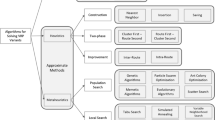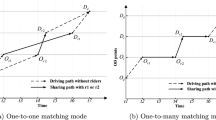Abstract
Less-than-truckload (LTL) transportation offers fast, flexible and relatively low-cost transportation services to shippers. In order to cope with the effects of economic recessions, the LTL industry implemented ideas such as reducing excess capacity and increasing revenues through better yield management. In this paper, we extend these initiatives beyond the reach of individual carriers and propose a collaborative framework that facilitates load exchanges to reduce the operational costs. Even though collective solutions are proven to provide benefits to the participants by reducing the inefficiencies using a system-wide perspective, such solutions are often not attainable in real-life as the negotiating parties are seeking to maximize their individual profits rather than the overall profit and also they are unwilling to share confidential information. Therefore, a mechanism that enables collaboration among the carriers should account for the rationality of the individual participants and should require minimal information transfer between participants. Having this in mind, we propose a mechanism that facilities collaboration through a series of load exchange iterations and identifies an equilibrium among selfish carriers with limited information transfer among the participants. Our time-efficient mechanism can handle large instances with thousands of loads as well as provide significant benefits over the non-collaborative management of LTL networks.


Similar content being viewed by others
References
America Trucking Associations (2019) Reports, Trends & Statistics. Date Accessed 20 September 2019 https://www.trucking.org/article/Trucking-Industry-Revenues-Top-$796-Billion-in-2018
Barcos L, Rodriguez V, Alvarez MJ, Robuste F (2010) Routing design for less-than-truckload motor carriers using ant colony optimization. Transport Res Part E: Logist Transport Rev 46(3):367–383
Berger S, Bierwirth C (2010) Solutions to the request reassignment problem in collaborative carrier networks. Transport Res Part E: Logist Transport Rev 46(5):627–638
Carbajal JA, Erera A, Savelsbergh M (2013) Balancing fleet size and repositioning costs in LTL trucking. Ann Oper Res 203(1):235–254
Caschili S, Medda F, Parola F, Ferrari C (2014) An analysis of shipping agreements: The Cooperative Container Network. Netw Spatial Econ 14 (3):357–377
Castelli L, Longo F, Pesenti G, Parola R, Ukovich W (2004) Two-player noncooperative games over a freight transportation network. Transport Sci 38(2):149–159
Chen H (2016) Combinatorial clock-proxy exchange for carrier collaboration in less than truck load transportation. Transp Res E 91:152–172
Crainic TG (2000) Service network design in freight transportation. Eur J Oper Res 122(2):272–288
Cruijssen F, Borm P, Fleuren H, Hamers H (2010) Supplier-initiated outsourcing: A methodology to exploit synergy in transportation. Eur J Oper Res 207(2):763–774
Dai B, Chen H (2012a) A benders decomposition approach for carrier collaborative planning with less than truckload transportation. Int J Model Oper Manag 2(3):242–265
Dai B, Chen H (2012b) Profit allocation mechanisms for carrier collaboration in pickup and delivery service. Comput Ind Eng 62(2):633–643
Erera AL, Hewitt M, Savelsbergh M, Zhang Y (2013a) Creating schedules and computing operating costs for LTL load plans. Comput Oper Res 40(3):691–702
Erera AL, Hewitt M, Savelsbergh M, Zhang Y (2013b) Improved load plan design through integer programming based local search. Transp Sci 47(3):412–427
Ergun Ö, Kuyzu G, Savelsbergh M (2007a) Reducing truckload transportation costs through collaboration. Transp Sci 41(2):206–221
Ergun Ö, Kuyzu G, Savelsbergh M (2007b) The shipper collaboration problem. Comput Oper Res 34(6):1551–1560
Figliozzi M (2006) Analysis and evaluation of incentive-compatible dynamic mechanisms for carrier collaboration. Transport Res Record: J Transport Res Board 1966(1):34–40
Friesz TL, Mookherjee R, Holguín-Veras J, Rigdon MA (2008) Dynamic pricing in an urban freight environment. Transp Res B 42:305–324
Gansterer M, Hartl RF (2018) Centralized bundle generation in auction-based collaborative transportation. OR Spectrum 40(3):613–635
Hernández S., Peeta S, Kalafatas G (2011) A less-than-truckload carrier collaboration planning problem under dynamic capacities. Transport Res Part E: Logist Transport Rev 47(6):933–946
Hernández S, Peeta S (2014) A carrier collaboration problem for less-than-truckload carriers: characteristics and carrier collaboration model. Transportmet A: Transport Sci 10(4):327–349
Huang GQ, Xu SX (2013) Truthful multi-unit transportation procurement auctions for logistics e-marketplaces. Transp Res B 47:127–148
Jarrah AI, Johnson E, Neubert LC (2009) Large-scale, less-than-truckload service network design. Oper Res 57(3):609–625
Journal of Commerce (2019) Top 50 trucking company rankings 2018. Date Accessed 20 September 2019 https://www.joc.com/trucking-logistics/top-50-trucking-company-rankings-2018_20190813.html./
Kaewpuang R, Niyato D, Tan P, Wang P (2017) Cooperative management in Full-Truckload and Less-Than-Truckload vehicle system. IEEE Trans Veh Technol 66(7):5707–5722
Li J, Cai X, Zeng Y (2016a) Cost allocation for less-than-truckload collaboration among perishable product retailers. OR Spectrum 38 (1):81–117
Li Y, Chen H, Prins C (2016b) Lagrangian relaxation approach to combinatorial exchange in freight logistics. IFAC-PapersOnLine 49 (12):1650–1655
Lyu X, Chen H, Wang N, Yang Z (2019) A multi-round exchange mechanism for carrier collaboration in less than truckload transportation. Transp Res E 129:38–59
Nadarajah S, Bookbinder JH (2013) Less-than-truckload carrier collaboration problem: modeling framework and solution approach. J Heuristics 19 (6):917–942
Özener OÖ, Ergun Ö (2008) Allocating costs in a collaborative transportation procurement network. Transp Sci 42(2):146–165
Özener O. Ö, Ergun Ö, Savelsbergh M (2011) Lane-exchange mechanisms for truckload carrier collaboration. Transp Sci 45(1):1–17
Scrimali L (2019) On the Stability of Coalitions in Supply Chain Networks via Generalized Complementarity Conditions. Networks and Spatial Economics
Sheffi Y (2004) Combinatorial auctions in the procurement of transportation services. Interfaces 34(4):245–252
Stein O, Sudermann-Merx N (2018) The noncooperative transportation problem and linear generalized Nash games. Eur J Oper Res 266(2):543–553
Tamannaei M, Zarei H, Aminzadegan S (2021) A Game-Theoretic Approach to the Freight Transportation Pricing Problem in the Presence of Intermodal Service Providers in a Competitive Market. Networks and Spatial Economics
Tyan JC, Wang FK, Du TC (2003) An evaluation of freight consolidation policies in global third party logistics. Omega 31(1):55–62
Wang X, Kopfer H, Gendreau M (2014) Operational transportation planning of freight forwarding companies in horizontal coalitions. Eur J Oper Res 31(1):1133–1141
Wieberneit N (2008) Service network design for freight transportation: A review. OR Spectrum 30(1):77–112
Xiao F, Yang H (2007) Three-player game-theoretic model over a freight transportation network. Transp Res C 15(4):209–217
Yen JY (1971) Finding the k shortest loopless paths in a network. Mangement Science 17(11):661–786
Yilmaz O, Savasaneril S (2012) Collaboration among small shippers in a transportation market. Eur J Oper Res 218(2):408–415
Zhang B, Yao T, Friesz TL, Sun Y (2015) A tractable two-stage robust winner determination model for truckload service procurement via combinatorial auctions. Transp Res B 78:16–31
Zhou G, Hui YV, Liang L (2011) Strategic alliance in freight consolidation. Transport Res Part E: Logist Transport Rev 47(1):18–29
Acknowledgements
The authors would like to thank the editor and the anonymous referees who kindly provided valuable suggestions and comments to improve this manuscript.
Author information
Authors and Affiliations
Corresponding author
Additional information
Publisher’s Note
Springer Nature remains neutral with regard to jurisdictional claims in published maps and institutional affiliations.
Rights and permissions
About this article
Cite this article
Altan, B., Özener, O.Ö. A Game Theoretical Approach for Improving the Operational Efficiencies of Less-than-truckload Carriers Through Load Exchanges. Netw Spat Econ 21, 547–579 (2021). https://doi.org/10.1007/s11067-021-09536-7
Accepted:
Published:
Issue Date:
DOI: https://doi.org/10.1007/s11067-021-09536-7




